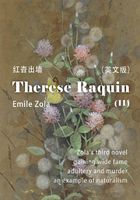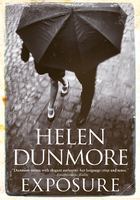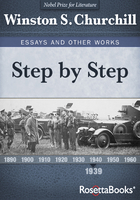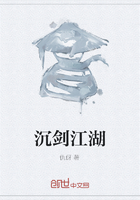I knew Carlotta Fell in the early days before the war. Then she was escaping into art, and was just "Fell". That was at our famous but uninspired school of art, the Thwaite, where I myself was diligently murdering my talent. At the Thwaite they always gave Carlotta the Still-life prizes. She accepted them calmly, as one of our conquerors, but the rest of the students felt vicious about it. They called it buttering the laurels, because Carlotta was Hon., and her father a well-known peer.
She was by way of being a beauty too. Her family was not rich, yet she had come into five hundred a year of her own, when she was eighteen; and that, to us, was an enormity. Then she appeared in the fashionable papers, affecting to be wistful, with pearls, slanting her eyes. Then she went and did another of her beastly still-lives, a cactus-in-a-pot.
At the Thwaite, being snobs, we were proud of her too. She showed off a bit, it is true, playing bird of paradise among the pigeons. At the same time, she?was?thrilled to be with us, and out of her own set. Her wistfulness and yearning "for something else" was absolutely genuine. Yet she was not going to hobnob with us either, at least not indiscriminately.
She was ambitious, in a vague way. She wanted to coruscate, somehow or other. She had a family of clever and "distinguished" uncles, who had flattered her. What then?
Her cactuses-in-a-pot were admirable. But even she didn't expect them to start a revolution. Perhaps she would rather glow in the wide if dirty skies of life than in the somewhat remote and unsatisfactory ether of Art.
She and I were "friends" in a bare, stark, but real sense. I was poor, but I didn't really care. She didn't really care either. Whereas I did care about some passionate vision which, I could feel, lay embedded in the half-dead body of this life. The quick body within the dead. I could?feel?it. And I wanted to get at it, if only for myself.
She didn't know what I was after. Yet she could feel that I was It, and, being an aristocrat of the Kingdom of It, as well as the realm of Great Britain, she was loyal—loyal to me because of It, the quick body which I imagined within the dead.
Still, we never had much to do with one another. I had no money. She never wanted to introduce me to her own people. I didn't want it either. Sometimes we had lunch together, sometimes we went to a theatre, or we drove in the country, in some car that belonged to neither of us. We never flirted or talked love. I don't think she wanted it, any more than I did. She wanted to marry into her own surroundings, and I knew she was of too frail a paste to face my future.
Now I come to think of it, she was always a bit sad when we were together. Perhaps she looked over seas she would never cross. She belonged finally, fatally, to her own class. Yet I think she hated them. When she was in a group of people who talked "smart", titles and?beau monde?and all that, her rather short nose would turn up, her wide mouth press into discontent, and a languor of bored irritation come even over her broad shoulders. Bored irritation, and a loathing of climbers, a loathing of the ladder altogether. She hated her own class: yet it was also sacrosanct to her. She disliked, even to me, mentioning the titles of her friends. Yet the very hurried resentment with which she said, when I asked her: Who is it—?
"Lady Nithsdale, Lord Staines—old friends of my mother," proved that the coronet was wedged into her brow, like a ring of iron grown into a tree.
She had another kind of reverence for a true artist: perhaps more genuine, perhaps not; anyhow, more free and easy.
She and I had a curious understanding in common: an inkling, perhaps, of the unborn body of life hidden within the body of this half-death which we call life: and hence a tacit hostility to the commonplace world, its inert laws. We were rather like two soldiers on a secret mission into enemy country. Life, and people, was an enemy country to us both. But she would never declare herself.
She always came to me to find out what I thought, particularly in a moral issue. Profoundly, fretfully discontented with the conventional moral standards, she didn't know how to take a stand of her own. So she came to me. She had to try to get her own feelings straightened out. In that she showed her old British fibre. I told her what, as a young man, I thought: and usually she was resentful. She did so want to be conventional. She would even act quite perversely, in her determination to be conventional. But she always had to come back to me, to ask me again. She depended on me morally. Even when she disagreed with me, it soothed her, and restored her to know my point of view. Yet she disagreed with me.
We had then a curious abstract intimacy, that went very deep, yet showed no obvious contact. Perhaps I was the only person in the world with whom she felt, in her uneasy self, at home, at peace. And to me, she was always of my own?intrinsic?sort, of my own species. Most people are just another species to me. They might as well be turkeys.
But she would always?act?according to the conventions of her class, even perversely. And I knew it.
So, just before the war she married Lord Lathkill. She was twenty-one. I did not see her till war was declared; then she asked me to lunch with her and her husband, in town. He was an officer in a Guards regiment, and happened to be in uniform, looking very handsome and well set-up, as if he expected to find the best of life served up to him for ever. He was very dark, with dark eyes and fine black hair, and a very beautiful, diffident voice, almost womanish in its slow, delicate inflections. He seemed pleased and flattered at having Carlotta for a wife.
To me he was beautifully attentive, almost deferential, because I was poor, and of the other world, those poor devils of outsiders. I laughed at him a little, and laughed at Carlotta, who was a bit irritated by the gentle delicacy with which he treated me.
She was elated too. I remember her saying:
"We need war, don't you think? Don't you think men need the fight, to keep life chivalrous and put martial glamour into it?"
And I remember saying: "I think we need some sort of fight; but my sort isn't the war sort." It was August, we could take it lightly.
"What's your sort?" she asked quickly.
"I don't know: single-handed, anyhow," I said, with a grin. Lord Lathkill made me feel like a lonely sansculotte, he was so completely unostentatious, so very willing to pay all the attention to me, and yet so subtly complacent, so unquestionably sure of his position. Whereas I was not a very sound earthenware pitcher which had already gone many times to the well.
He was not conceited, not half as?conceited?as I was. He was willing to leave me all the front of the stage, even with Carlotta. He felt so sure of some things, like a tortoise in a glittering, polished tortoise-shell that mirrors eternity. Yet he was not quite easy with me.
"You are Derbyshire?" I said to him, looking into his face. "So am I! I was born in Derbyshire."
He asked me with a gentle, uneasy sort of politeness, where? But he was a bit taken aback. And his dark eyes, brooding over me, had a sort of fear in them. At the centre they were hollow with a certain misgiving. He was so sure of?circumstances, and not by any means sure of the man in the middle of the circumstances. Himself! Himself! That was already a ghost.
I felt that he saw in me something crude but real, and saw himself as something in its own way perfect, but quite unreal. Even his love for Carlotta, and his marriage, was a circumstance that was inwardly unreal to him. One could tell by the curious way in which he waited, before he spoke. And by the hollow look, almost a touch of madness, in his dark eyes, and in his soft, melancholy voice.
I could understand that she was fascinated by him. But God help him if ever circumstances went against him!
She had to see me again, a week later, to talk about him. So she asked me to the opera. She had a box, and we were alone, and the notorious Lady Perth was two boxes away. But this was one of Carlotta's conventional perverse little acts, with her husband in France. She only wanted to talk to me about him.
So she sat in the front of her box, leaning a little to the audience and talking sideways to me. Anyone would have known at once there was a?liaison?between us, howdangereuse?they would never have guessed. For there, in the full view of the world—her world at least, not mine—she was talking sideways to me, saying in a hurried, yet stony voice:
"What do you think of Luke?"
She looked up at me heavily, with her sea-coloured eyes, waiting for my answer.
"He's tremendously charming," I said, above the theatreful of faces.
"Yes, he's that!" she replied, in the flat, plangent voice she had when she was serious, like metal ringing flat, with a strange far-reaching vibration. "Do you think he'll be happy?"
"Be?happy!" I ejaculated. "When,?be?happy?"
"With me," she said, giving a sudden little snirt of laughter, like a schoolgirl, and looking up me shyly, mischievously, anxiously.
"If you make him," I said, still casual.
"How can I make him?"
She said it with flat plangent earnestness. She was always like that, pushing me deeper in than I wanted to go.
"Be happy yourself, I suppose: and quite sure about it. And then?tell?him you're happy, and tell him he is, too, and he'll be it."
"Must I do all that?" she said rapidly. "Not otherwise?"
I knew I was frowning at her, and she was watching my frown.
"Probably not," I said roughly. "He'll never make up his mind about it himself."
"How did you know?" she asked, as if it had been a mystery.
"I didn't. It only seems to me like that."
"Seems to you like that," she re-echoed, in that sad, clean monotone of finality, always like metal. I appreciate it in her, that she does not murmur or whisper. But I wished she left me alone, in that beastly theatre.
She was wearing emeralds, on her snow-white skin, and leaning forward gazing fixedly down into the auditorium, as a crystal-gazer into a crystal. Heaven knows if she saw all those little facets of faces and plastrons. As for me, I knew that, like a sansculotte, I should never be king till breeches were off.
"I had terrible work to make him marry me," she said, in her swift, clear, low tones.
"Why?"
"He was frightfully in love with me.?He is!?But he thinks he's unlucky… ."
"Unlucky, how? In cards or in love?" I mocked.
"In both," she said briefly, with sudden cold resentment at my flippancy. There was over her eyes a glaze of fear. "It's in their family."
"What did you say to him?" I asked, rather laboured feeling the dead weight.
"I promised to have luck for two," she said. "And war was declared a fortnight later."
"Ah, well!" I said. "That's the world's luck, not yours."
"Quite!" she said.
There was a pause.
"Is his family supposed to be unlucky?" I asked.
"The Worths? Terribly! They really are!"
It was interval, and the box door had opened. Carlotta always had her eye, a good half of it at least, on the external happenings. She rose, like a reigning beauty—which she wasn't, and never became—to speak to Lady Perth, and out of spite, did not introduce me.
Carlotta and Lord Lathkill came, perhaps a year later, to visit us when we were in a cottage in Derbyshire, and he was home on leave. She was going to have a child, and was slow, and seemed depressed. He was vague, charming, talking about the country and the history of the lead-mines. But the two of them seemed vague, as if they never got anywhere.
The last time I saw them was when the war was over, and I was leaving England. They were alone at dinner, save for me. He was still haggard, with a wound in the throat. But he said he would soon be well. His slow, beautiful voice was a bit husky now. And his velvety eyes were hardened, haggard, but there was weariness, emptiness in the hardness.
I was poorer than ever, and felt a little weary myself. Carlotta was struggling with his silent emptiness. Since the war, the melancholy fixity of his eyes was more noticeable, the fear at the centre was almost monomania. She was wilting and losing her beauty.
There were twins in the house. After dinner, we went straight up to look at them, to the night nursery. They were two boys, with their father's fine dark hair, both of them.
He had put out his cigar, and leaned over the cots, gazing in silence. The nurse, dark-faced and faithful, drew back. Carlotta glanced at her children; but more helplessly, she gazed at him.
"Bonny children! Bonny boys, aren't they, nurse?" I said softly.
"Yes, sir!" she said quickly. "They are!"
"Ever think I'd have twins, roistering twins?" said Carlotta, looking at me.
"I never did," said I.
"Ask Luke whether it's bad luck or bad management," she said, with that schoolgirl's snirt of laughter, looking up apprehensively at her husband.
"Oh, I!" he said, turning suddenly and speaking loud, in his wounded voice. "I call it amazing good luck, myself! Don't know what other people think about it." Yet he had the fine, wincing fear in his body, of an injured dog.
After that, for years I did not see her again. I heard she had a baby girl. Then a catastrophe happened: both the twins were killed in a motor-car accident in America, motoring with their aunt.
I learned the news late, and did not write to Carlotta. What could I say?
A few months later, crowning disaster, the baby girl died of some sudden illness. The Lathkill ill-luck seemed to be working surely.
Poor Carlotta! I had no further news of her, only I heard that she and Lord Lathkill were both living in seclusion, with his mother, at the place in Derbyshire.
When circumstances brought me to England, I debated within myself, whether I should write or not to Carlotta. At last I sent a note to the London address.
I had a reply from the country: "So glad you are within reach again! When will you come and see us?"
I was not very keen on going to Riddings. After all, it was Lord Lathkill's place, and Lady Lathkill, his mother, was old and of the old school. And I always something of a sansculotte, who will only be king when breeches are off.
"Come to town," I wrote, "and let us have lunch together."
She came. She looked older, and pain had drawn horizontal lines across her face.
"You're not a bit different," she said to me.
"And you're only a little bit," I said.
"Am I!" she replied, in a deadened, melancholic voice. "Perhaps! I suppose while we live we've got to live. What do you think?"
"Yes, I think it. To be the living dead, that's awful."
"Quite!" she said, with terrible finality.
"How is Lord Lathkill?" I asked.
"Oh," she said. "It's finished him, as far as living is concerned. But he's very willing for?me?to live."
"And you, are you willing?" I said.
She looked up into my eyes, strangely.
"I'm not sure," she said. "I need help. What do you think about it?"
"Oh, God, live if you can!"
"Even take help?" she said, with her strange involved simplicity.
"Ah, certainly."
"Would you recommend it?"
"Why, yes! You are a young thing—" I began.
"Won't you come down to Riddings?" she said quickly.
"And Lord Lathkill—and his mother?" I asked.
"They want you."
"Do you want me to come?"
"I want you to, yes! Will you?"
"Why, yes, if you want me."
"When, then?"
"When you wish."
"Do you mean it?"
"Why, of course."
"You're not afraid of the Lathkill ill-luck?"
"I!"?I exclaimed in amazement; such amazement, that she gave her schoolgirl snirt of laughter.
"Very well, then," she said. "Monday? Does that suit you?"
We made arrangements, and I saw her off at the station.
I knew Riddings, Lord Lathkill's place, from the outside. It was an old Derbyshire stone house, at the end of the village of Middleton: a house with three sharp gables, set back not very far from the high road, but with a gloomy moor for a park behind.
Monday was a dark day over the Derbyshire hills. The green hills were dark, dark green, the stone fences seemed almost black. Even the little railway station, deep in the green, cleft hollow, was of stone, and dark and cold, and seemed in the underworld.
Lord Lathkill was at the station. He was wearing spectacles, and his brown eyes stared strangely. His black hair fell lank over his forehead.
"I'm so awfully glad you've come," he said. "It is cheering Carlotta up immensely."
Me, as a man myself, he hardly seemed to notice. I was something which had arrived, and was expected. Otherwise he had an odd, unnatural briskness of manner.
"I hope I shan't disturb your mother, Lady Lathkill," I said as he tucked me up in the car.
"On the contrary," he sang, in his slow voice, "she is looking forward to your coming as much as we both are. Oh no, don't look on mother as too old-fashioned, she's not so at all. She's tremendously up to date in art and literature and that kind of thing. She has her leaning towards the uncanny—spiritualism, and that kind of thing—nowadays, but Carlotta and I think that if it gives her an interest, all well and good."
He tucked me up most carefully in the rugs, and the servant put a foot-warmer at my feet.
"Derbyshire, you know, is a cold county," continued Lord Lathkill, "especially among the hills."
"It's a very dark county," I said.
"Yes, I suppose it is, to one coming from the tropics. We, of course, don't notice it; we rather like it."
He seemed curiously smaller, shrunken, and his rather long cheeks were sallow. His manner, however, was much more cheerful, almost communicative. But he talked, as it were, to the faceless air, not really to me. I wasn't really there at all. He was talking to himself. And when once he looked at me, his brown eyes had a hollow look, like gaps with nothing in them except a haggard, hollow fear. He was gazing through the windows of nothingness, to see if I were really there.
It was dark when we got to Riddings. The house had no door in the front, and only two windows upstairs were lit. It did not seem very hospitable. We entered at the side, and a very silent manservant took my things.
We went upstairs in silence, in the dead-seeming house. Carlotta had heard us, and was at the top of the stairs. She was already dressed; her long white arms were bare; she had something glittering on a dull green dress.
"I was so afraid you wouldn't come," she said, in a dulled voice, as she gave me her hand. She seemed as if she would begin to cry. But of course she wouldn't. The corridor, dark-panelled and with blue carpet on the floor, receded dimly, with a certain dreary gloom. A servant was diminishing in the distance, with my bags, silently. There was a curious, unpleasant sense of the fixity of the materials of the house, the obscene triumph of dead matter. Yet the place was warm, central-heated. Carlotta pulled herself together and said, dulled: "Would you care to speak to my mother-in-law before you go to your room? She would like it."
We entered a small drawing-room abruptly. I saw the water-colours on the walls and a white-haired lady in black bending round to look at the door as she rose cautiously.
"This is Mr. Morier, Mother-in-law," said Carlotta, in her dull, rather quick way, "on his way to his room."
The dowager Lady Lathkill came a few steps forward, leaning from heavy hips, and gave me her hand. Her crest of hair was snow white, and she had curious blue eyes, fixed, with a tiny dot of a pupil, peering from her pink, soft-skinned face of an old and well-preserved woman. She wore a lace fichu. The upper part of her body was moderately slim, leaning forward slightly from her heavy black-silk hips.
She murmured something to me, staring at me fixedly for a long time, but as a bird does, with shrewd, cold far-distant sight. As a hawk, perhaps, looks shrewdly far down, in his search. Then, muttering, she presented to me the other two people in the room: a tall, short-faced, swarthy young woman with the hint of a black moustache; and a plump man in a dinner-jacket, rather bald and ruddy, with a little grey moustache, but yellow under the eyes. He was Colonel Hale.
They all seemed awkward, as if I had interrupted them at a séance. I didn't know what to say: they were utter strangers to me.
"Better come and choose your room, then," said Carlotta, and I bowed dumbly, following her out of the room. The old Lady Lathkill still stood planted on her heavy hips, looking half round after us with her ferret's blue eyes. She had hardly any eyebrows, but they were arched high up on her pink, soft forehead, under the crest of icily white hair. She had never emerged for a second from the remote place where she unyieldingly kept herself.
Carlotta, Lord Lathkill and I tramped in silence down the corridor and round a bend. We could none of us get a word out. As he suddenly rather violently flung open a door at the end of the wing, he said, turning round to me with a resentful, hang-dog air:
"We did you the honour of offering you our ghost room. It doesn't look much, but it's our equivalent for a royal apartment."
It was a good-sized room with faded, red-painted panelling showing remains of gilt, and the usual big, old mahogany furniture, and a big pinky-faded carpet with big, whitish, faded roses. A bright fire was burning in the stone fire-place.
"Why?" said I, looking at the stretches of the faded, once handsome carpet.
"Why what?" said Lord Lathkill. "Why did we offer you this room?"
"Yes! No! Why is it your equivalent for a royal apartment?"
"Oh, because our ghost is as rare as sovereignty in her visits, and twice as welcome. Her gifts are infinitely more worth having."
"What sort of gifts?"
"The family fortune. She invariably restores the family fortune. That's why we put you here, to tempt her."
"What temptation should?I?be?—especially to restoring your family fortunes. I didn't think they needed it, anyhow."
"Well!" he hesitated. "Not exactly in money: we can manage modestly that way; but in everything else but money—"
There was a pause. I was thinking of Carlotta's "luck for two". Poor Carlotta! She looked worn now. Especially her chin looked worn, showing the edge of the jaw. She had sat herself down in a chair by the fire, and put her feet on the stone fender, and was leaning forward, screening her face with her hand, still careful of her complexion. I could see her broad, white shoulders, showing the shoulder-blades, as she leaned forward, beneath her dress. But it was as if some bitterness had soaked all the life out of her, and she was only weary, or inert, drained of her feelings. It grieved me, and the thought passed through my mind that a man should take her in his arms and cherish her body, and start her flame again. If she would let him, which was doubtful.
Her courage was fallen, in her body; only her spirit fought on. She would have to restore the body of her life, and only a living body could do it.
"What?about?your ghost?" I said to him. "Is she really ghastly?"
"Not at all!" he said. "She's supposed to be lovely. But I have no experience, and I don't know anybody who has. We hoped you'd come, though, and tempt her. Mother had a message about you, you know."
"No, I didn't know."
"Oh yes! When you were still in Africa. The medium said: 'There is a man in Africa. I can only see M, a double M. He is thinking of your family. It would be good if he entered your family.' Mother was awfully puzzled, but Carlotta said 'Mark Morier' at once."
"That's not why I asked you down," said Carlotta quickly, looking round, shading her eyes with her hand as she looked at me.















